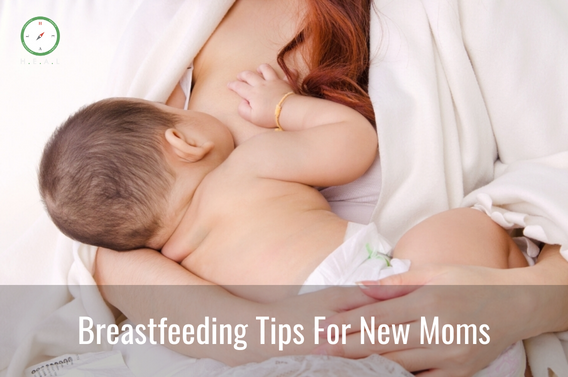The breastfeeding process has most of the time been a controversial aspect for a new mother who struggles with misconceptions, challenges, and myths of our society. The day we become breastfeeding and nursing mothers, we are handed over a list of traditional things to get and a set of rules and regulations to follow which we barely question.

Thanks to the lactation consultants with whom, we, as new breastfeeding moms, can open up about our difficulties and are ready to perform whatever it takes to nourish our newborn for his/her better health in the future. An experienced lactation consultant prescribes bookish knowledge as well as share personal experience and research with other patients which helps to determine various problems and their solutions in a better way. However, one should reach out to a lactation consultant and get proper breastfeeding education for new moms as early as possible for the best results.
Breast milk is like an elixir for the newborn. The benefits of breastfeeding are widely well-known, which include from prevention of childhood obesity to decreased risk of infection, skin diseases, and allergies. So if you decide to breastfeed a try, be assured that with a little bit of patience, some smart planning, and a firm determination, you have an increased chance of experiencing success and securing good health for your baby, you can positively nurse your baby for a few days or weeks, and provide that early milk, called colostrum, empowers an important source of antibodies that tends to protect against disease as Baby's own immune system develops during the first year.

Breastfeeding is a naturally learned process. None of us (not even Baby) are born knowing how to do it successfully. Though there is some proper breastfeeding education for the new mom to improve their chance of success. They are as follows:
Try to breastfeed within the first hour of delivery. This helps your uterus contract and generate that valuable colostrum. Also, ask for a Baby room with you at the hospital so you can feed the baby on demand.
About the third or fourth day after birth, prepare for your milk to come in. It happened because the breasts suddenly increased several cup sizes. Make sure you have several well-fitting nursing bras and don't forget to pack one in your hospital bag.
Try to breastfeed about eight to 12 times every 24 hours. Your baby is good at giving hunger signals like rooting around searching for your nipple, putting his hand in his mouth, and looking increasingly for you.
Stay hydrated all the time to ensure your body can make enough milk. A better idea is to take a glass of water beforehand during nursing.
Nurse in a serene environment to help your milk let down. After a while, all it will take for your milk to let down is unhooking your bra for your baby, or even just heeding any infant's cry.
Try not to introduce a bottle or other nipples, including pacifiers to your baby until breastfeeding is well established. The thrusting motion needed to nurse is different from that required to suck a nipple, and the Baby could get confused.

There are not always good factors that work in breastfeeding. New mothers go through various discomfort during initial nursing. Here are the most common breastfeeding-related problems and tricks to prevent them:
Sore and cracked nipples
Sore nipples are a very common problem in new mothers. Check the position of the baby when he/she latches on; after each nursing, session let your nipples air dry. Also, alternate which breast you start on for each session.
Blocked milk duct
Warm compresses, letting warm water run over your breasts in the shower, or laying cabbage leaves on your breasts can help relieve some of the pressure of the blocked milk. One can also try pumping some milk between feedings.
Mastitis or breast infection
If you feel like having the flu and one breast is red, hot, and sore, you are probably encountering mastitis. You will likely need an antibiotic course to clear up the infection. In the meantime, keep nursing or pumping on that side repeatedly as much as you can, even though it hurts. To prevent mastitis, make sure you drain your breasts regularly.
Thrush
Thrush is a fungal infection more severe than mastitis. It can develop on the breast and be passed between your breast and the baby's mouth. Overly moist breasts, sore or cracked nipples, pursuing a diet high in sugar or yeasty foods or taking antibiotics, birth control pills, or steroids can all strike your body's natural yeast levels out of control and lead to thrush.
Breastfeeding is a basic instinct of supply-and-demand activity. The more you nurse, the more milk your body prepares. Enlightened professional breastfeeding education for new mothers can eradicate all the problems and help to enjoy a memorable journey as new moms. However, when your baby goes through a growth spurt and demands to be nursing all the time, understand that he/she is signaling your body to up the milk production for their new nutritional needs.
Vidhi Beri is a renowned Global Educator and Specialist in the fields of Holistic Health, Lactation, Maternal Health Wellness, Child Nutrition, and Children's Milestone Development with effective and well-structured maternity wellness programs offered to the new wave of freshly home-grown Indian mommies and babies, with her desi tadka of Ancient Indian sciences in her latest book, Decoding Motherhood, one of the best Maternity books India. Visit Vidhi Beri’s official website to know more- https://www.vidhiberi.com/.